Welcome back to the Winden woods. Time has looped you back to me, but I bring not a copy of Tannhaus’ Journey Through Time (though a fine read I’m sure) but the second part of my look at angst and Weltschmerz in Netflix’s hit sci-fi drama Dark.
Last time I looked at how the show reflects particular German concepts of angst (a complaint about the way the world is) and Weltschmerz (an experience of suffering in the world and at the state of the world, with the feeling that the two are linked), specifically in relation the introduction of nuclear power to Winden and the effect this has on the local community.
This time I will be examining the gap between how we perceive people and the reality and how, when escalated by time travel, the characters of Dark are subjected to greater levels of angst and Weltschmerz.
So come with me once more to the Winden woods but be careful who you bump into – you never know which face they’re hiding behind the face they show…
One Person Hides Many
It’s common knowledge that, as people, we will act differently depending on who we are with, the scenario and the location. There is nothing duplicitous or disingenuous about this, nor is it a manifestation of multiple personalities. It is how we have learned to engage with the social codes of our society, to ensure we are acting in a way that does not isolate us or damage our standing in a community. For example, we would not make crass or lewd jokes to our boss if we knew them to be a sensitive person, or very straight laced.
Essentially we are adapting ourselves to our audience. On a subconcious level we present the side of ourselves that is most appropriate to the situation we are in and the people we are with.
What this suggests is that the human personality is far more multi-faceted than perhaps we give it credit for. It‘s not to say that we are completely different people when we are in different situations, but we do show different degrees of ourselves. When I am with my work colleagues, for example, I might not show the same level of openness or vulnerability that I might show when I’m with my wife.
The problem arises when we have a fixed idea of another person and we see them behave in another, unexpected way. If my wife saw me at work, she might not completely recognise who she sees or at least by surprised by traits she is perhaps not aware of. My work colleagues also may notice a difference. I might tone down my humour for example, or show more sensitivity than normal.
The point at heart is that if we only see a person in one setting or scenario, we might find our illusions shattered to see them act in another way. And as we partly base our understanding of the rules of the world and the way we see it on our relationships with people, to see that people are not concrete in the way we believe them to be is to realise the world is not how we believe it to be, engendering a fearful state of angst and Weltschmerz.
And this is before you throw time travel in the mix.
An Unrequited Love Is A Painful Thing
You would be forgiven when thinking about the relationships between the Kahnwald’s and Nielson’s for focusing on the strange tangle of Auntie-and-Nephew lovers Jonas and Martha. But the love triangle between Katharina, Ulrich Nielson and Hannah Kahnwald is just as important and is a key component of the angst and welstchmerz that pervades Winden like a fog (or a nuclear fallout).
In 1986 Katharina and Hannah are friends of sorts but there is something hierarchical about the relationship. Hannah is two years younger than Katharina, which is reflected in Katharina’s rather dismissive, patronising attitude towards her.
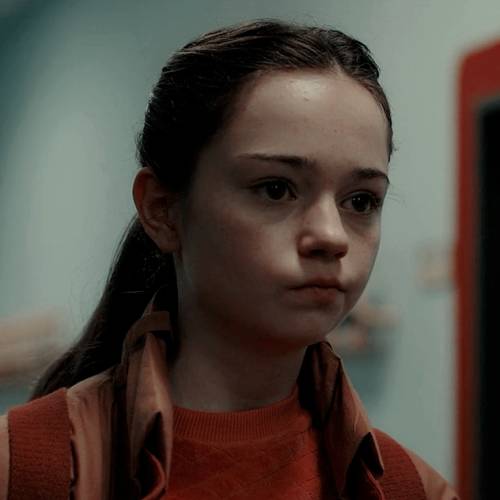
When Katharina tries to shock her friends by talking about a song that involves a girl with red lipstick being murdered, Hannah innocently repeats an opinion learnt from her elders, stating that her father told her only prostitutes wear lipstick and anyway, she prefers a different singer. ‘Hannah, you’re as square as they as come,’ comes the withering reply. Even their friends tell Katharina not to be so mean.
Ulrich, meanwhile, is much friendlier, but it is only that – friendliness. They talk about films, and make jokes about the apocalypse beginning in Winden (which will be much less a joke come 2020), but nothing more. Although a two year age gap is nothing much between two adults, as an adolescent it can be quite the gulf.
When they sit together at the bus stop one night, the age gap physically is quite striking – Ulrich looks like Hannah’s older brother. Perhaps he even sees her as a little sister figure, a Mads-replacement of sorts. But there is no romantic feeling. Ulrich only has eyes for Katharina and is quick to ditch Hannah for her as soon as he sees her in school. The silent bristling face of the just-ditched Hannah as Ulrich takes Katharina’s hand says it all.
Because you can see it in little Hannah’s face as she looks at Ulrich at the bus stop that night. You can see this chance to be alone with Ulrich, to share this moment of intimacy, means so much to her. You can see the cogs turn as she tries to think of an opening line, the little side glances filled with longing she carefully pitches his way. It is such hopeful joy of the ordinary that makes the ordinary special and romantic. And it will not come to pass. Not now.
An unrequited love is a painful thing, especially for an adolescent. But it should not be a trigger or precursor to angst or Weltschmerz. It shouldn’t give rise to doubt or concern about the way the world is. So what happened with Hannah?
Well, whilst ensconced in their love bubble, Ulrich and Katharina weren’t paying Hannah any real attention. Because if they had, and they had taken Hannah seriously, maybe things would have turned out much differently.
The Need To Believe The Heart’s Protective Story
Because Hannah is not just a little girl nursing a crush she will outgrow. She is not just some harmless, tasteless square. In fact, she is far more dangerous than even she realises.
It can certainly be inferred that Hannah’s compulsion towards Ulrich is obsessive bordering on pathological, even as a young girl. ‘Don’t think that I’m just going to let you go,’ she tells Ulrich in 2019 as he ends her affair, but the truth is she never had let him go, not for all those years. She had deluded herself into believing Ulrich was hers in all but actual possession.
When Katharina confronts Hannah in 2019 about the affair with Ulrich, Hannah spins a story that shifts all the blame onto Ulrich: ‘It’s over. I ended it. I never wanted any of it. But he just didn’t let up. You know how he can be. He wanted to leave you. I told him that was crazy. He said that he didn’t love you anymore. That he loves me. But I want you to know that it’s over now, Katharina.’
On first inspection it would appear Hannah is trying to save her neck and avert a beating from an aggressive Katharina. She points to Ulrich’s forceful nature to hint that she feared to reject his advances. Not only that, she points to a shared understanding between the two women of Ulrich’s nature (‘you know how he can be’), planting the seed in Katharina’s mind that Ulrich was the aggressor and pushed for the affair, with little Hannah being the victim.
But there is more than this at play. The way Hannah’s voice falls softly into her words, the lost look of confused yearning in her eyes: she needs to believe the story she is telling, a story she is telling herself as much as Katharina. She needs to believe Ulrich loves her, would leave Katharina for her, and that the affair wasn’t some petty little distraction for Ulrich from his everyday mundane existence.
Because to believe otherwise would to be to face the truth, that she was just a distraction for Ulrich, an Ulrich that has just told her in no uncertain terms the affair is over. To face reality would shatter her delusion and in turn shatter her. And as we shall see, when reality bites a little too closely, Hannah bites back. Much harder.
The Punishment Of A False Accusation
Back in 1986, and still feeling the hurt of Ulrich’s snub, Hannah’s day goes from bad to worse when she stumbles upon her worst fear: Ulrich and Katharina secretly having sex in the school sports locker room (where their son Magnus will also have sex with Franziska Doppler 33 years later).
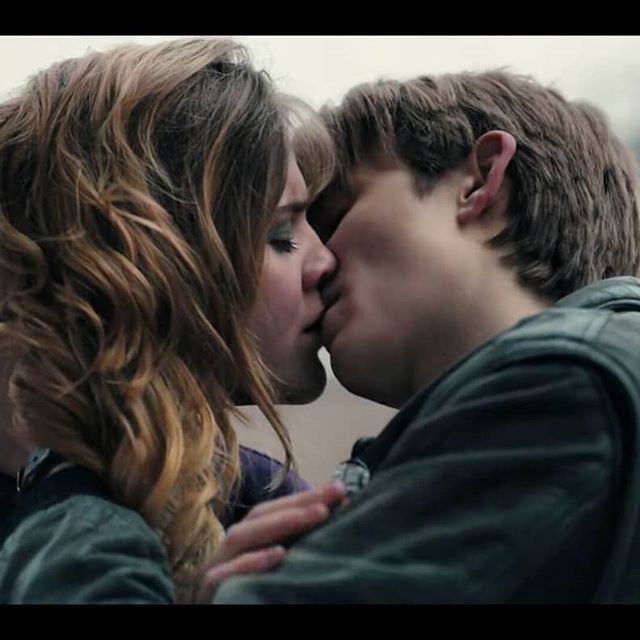
The couple do not know if they’ve been seen but for Hannah the damage is done. There is nothing more puncturing to a romantic delusion than seeing your beloved engaged in physical intimacy with another. It is not you they ‘chose’ (if that’s not too predatory a way of putting it) but another. And because Hannah is not entirely in control of her emotions, she does not know how to tame her hurt or to put it into context. She can only lash out.
This would all be good and well if she had some sort of hysterical outburst, maybe lashed out and screamed at a befuddled Ulrich and Katharina in public. Sure, it would have been embarrassing, undignified even, but Hannah might have learnt from the experience, understood in the aftermath how and why to control the intensity of her emotions, and that with an unrequited crush there is no one to blame. It is sadly just one of those things.
What makes Hannah dangerous is the strange paradox between impulse and planning. She acts to hurt off the spur of her own hurt. But she doesn’t lash out. Off the back of that impulse she stops to think, plot and scheme a revenge with which to damage the most. It is that reactive nature feeding into an ability to act, without thinking if the action is justified or even appropriate, that makes Hannah dangerous.
Ulrich and Katharina, guilty of nothing more than being in love, and perhaps of not taking Hannah seriously, are soon punished. Ulrich’s arch nemesis, police chief Egon Tiedemann, gleefully takes Ulrich away from his home in handcuffs. Although Katharina protests, the charge is of Ulrich raping her. Ulrich is locked in jail while the matter is investigated. Katharina’s mother, obviously believing her daughter’s protestations, gives Katharina a black eye as punishment for being sexually active. And all because little Hannah ‘innocently’ let her father know she had seen something that was not supposed to happen.
Ulrich is soon released from prison. But little do he and Katharina realise things are far from over.
A Crack In The Armour Of Obsession
So where do angst and Weltschmerz fit into this mess of obsession and betrayal?
Well, looking back at my first article, angst can be summarised as a complaint about the way the world is, whereas Weltschmerz is an experience of suffering in the world and at the state of the world, with the feeling that the two are linked. I think it is quite clear Hannah can be seen as caught in the grip of both feelings.
From the perspective of the ‘little girl’ looking up to the big kids and not being able or not being allowed to join in, Hannah’s anger is tinged in angst. The older people she wants to be taken seriously by as peers—Ulrich as a lover, Katharina as a friend—are dismissive of her, or tolerant at best.
When you couple this with the realisation that bursts Hannah’s bubble when she sees Ulrich and Katharina having sex, her rage in reaction to this and her subsequent act of reporting Ulrich to the police can be seen as a functioning work of angst, her complaint about the way the world is writ large through her act of revenge.
Furthermore, because this crack in the armour of her obsession has appeared, this sudden realisation of Ulrich’s lack of romantic interest, Hannah, however briefly, sees the world as it actually is for a moment. Because her suffering, her feeling of being snubbed, is linked with the state of the world, i.e. that Ulrich loves another, it is quite reasonable to label Hannah’s suffering as a feeling of weltschmerz. It’s the adolescent pain of someone who sees the world for the first time as it is and cannot accept that the world is not as she wants it to be. This is a feeling Hannah will never really outgrow.
But it is not only Hannah who is subject to feelings of angst and Weltschmerz.
Growing Up To Become What You Hated
One thing I don’t see addressed in critiques of Dark very often (and it is to the show’s credit that it doesn’t push this down the audience’s throat) is that Ulrich and Katharina, simply put, are just not very nice people.
OK, some of their acts can possibly be justified due to the stress and trauma they are experiencing. Ulrich snapping at Charlotte is understandable if not OK, when you consider the myriad of emotions he is experiencing trying to find his missing son. Likewise his attempted killing of Helge, as he honestly, desperately believes it will bring his son back.
Katharina’s ignoring of her older children, while still perhaps not OK, is understandable when you consider the shock, pain and panic she is experiencing waiting constantly on the edge of her nerves for news her son has been found, news she will eventually receive but not in a way she expects.
But outside of this it cannot be said they are particularly nice. The attitude towards the younger Hannah and her needs notwithstanding, they were bullies also. Ask poor Regina Tiedemann. They tied her to a rock in a cave (the cave?) in the Winden woods and left her over night, cold and frightened.
Regina confirms that Ulrich and Katharina never apologised for this, and the 1986 Katharina is even dismissive of any pain caused by the two: ‘It was a game. We wouldn’t have left you hanging there all night. We couldn’t have known you were so damn fragile!’ This last sentence in particular betrays a certain lack of empathy, a consequence of which will see that Regina sadly is a self-harmer, her arms bearing the scars of someone trying to deal with pain in their own way.
The devious Hannah uses this personal history to divert attention away from herself and cover her tracks. She tells Katharina it was Regina who reported Ulrich to the police, and Katharina is all too happy to believe her. The subsequent beating is only stopped by the surprise arrival of Aleksander Tiedemann bearing a gun and deciding to intervene.
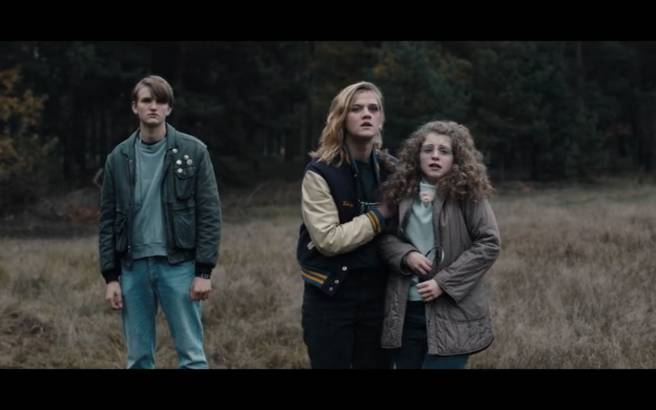
What’s interesting about this is that two such disagreeable people should end up in such powerful positions of authority in the Winden establishment: a detective and a head teacher. When you consider Ulrich especially, this is a surprise. In 2019 Katharina herself even says ‘you haven’t been here for a long time now. As long as I’ve known you, you’ve wanted out of Winden. Were you ever really happy?’ The 1986 Ulrich confirms this by telling Hannah that the first thing he’d wish for if the world began anew is a world without Winden.
Did Ulrich grow up to become everything he hated in his youth? His hatred of authority seemed to spring from the way he believed Egon Tiedemann incompetently investigated the disappearance of his brother Mads. Did he initially become a policeman to be everything that Egon couldn’t? And if he failed, just like Egon failed, would that mean he had been living a lie? Unlike Egon Ulrich does discover where the missing children are. But he cannot save them or bring them back. He is just as much a failure, by his own definitions, as Egon was.
Ulrich, however, was aware of his disillusionment long before that.
The Love Triangle Completed
On the morning of the death of Michael Kahnwald, Ulrich is trying to initiate physical intimacy with Katharina but she is not having it. She has too much to do that day, doesn’t feel particularly groomed, and then the kids walk in: standard obstacles to love making for a middle aged professional couple. But Ulrich stares at the ceiling, frustrated. We can assume that this has been the state of play for a good while.
Rather than do the mature thing and speak to Katharina about it—about how to make more time for themselves as a couple and reignite that spark—Ulrich falls into the trap of the middle age crisis. The pain he feels at the loss of the sexual excitement of his more carefree youthful days feeds into the pain of how the world is: a world where responsibilities and even passions change. The pain arises from his refusal to accept this change and work with it. He still needs to feel young, vital. His ego still needs to feel as if he is the alpha male. It is this sense of Weltschmerz that spurs him on into unfortunate action.
While Ulrich and Katharina are throwing a party at their house, and Katharina is settling a poorly Mikkel in his bed, Ulrich turns to the other major constant in his life since his teens: Hannah and her love for him.
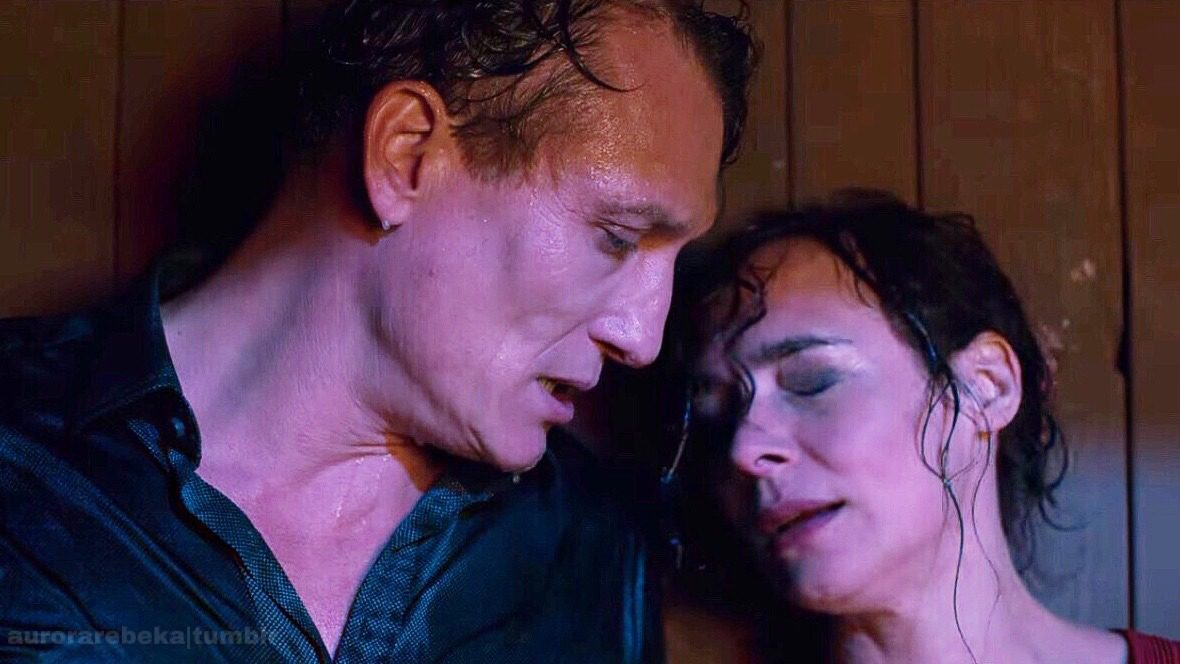
Hannah is the perfect person for Ulrich to grab onto, to make believe his still young and vital, to make pretend his world hasn’t changed with the passing of the years. Her obsession with Ulrich never left, as Ulrich knows when he notices Hannah’s upset stare as he dances with Katharina.
Outside the house Hannah and Ulrich share a smoke and some small talk. He makes her laugh by referring to the apocalypse (must be a German thing!) and this time it is Hannah’s turn to say with feeling that she would wish for a world without Winden. They run for cover from a sudden burst of storm and in the excitement they find their bodies close and one thing leads to another. Ulrich’s action here forms the representation of his angst, his act of complaint at his status as a man turned to middle age. The love triangle is complete. But there will be no fulfillment here.
‘You Don’t Need Me’
If angst is a complaint at the state of world, and Weltschmerz the link between the way the world is and the pain felt therein, it must be considered that to have one’s illusions shattered about how the world is would also bring angst and Weltschmerz at the realisation that the world is less than what you thought it to be. As Hannah briefly learnt this in 1986, so does Ulrich in 2019.
Not only does he find that the charges of uselessness that he held for so long against Egon can also be applied to him, but Katharina confronts him with his own uselessness as a husband, confirming she knows about the affair with Hannah. Yet the biggest shock to the system comes when Ulrich goes to confront Regina.
Ulrich thinks there is a link between his brother Mads and the missing Mikkel, but first he can’t help himself. For years Ulrich had held that Regina was responsible for informing the police he was a rapist. With righteous anger on her side, Regina coldly informs that she did or said no such thing, and when Ulrich dumbly confirms it was Hannah who had implied Regina’s guilt, she shuts him down and chastises him for his own stupidity: ‘Hannah? The same Hannah who at 14 was so in love with you that she would have done anything to have you? But I guess that hasn’t really changed.’
The penny drops. Not even Hannah, his constant, is what he thought she was. Seeing how the world really is, perhaps for the first time, Ulrich is completely given over to his state of Weltschmerz.
Well, not quite. Ulrich has one last hope and Hannah has one last trick up her sleeve.
Finally accessing time travel, Hannah goes to the Winden of 1954 where Ulrich has been locked in a psychiatric ward. She assumes Katharina’s identity and manages to see him.
Her love for Ulrich is still evident, Ulrich’s joy at seeing her almost matching hers at seeing him. His tone changes almost immediately, though, as he starts asking about his family and it is clear that whatever joy he has at seeing Hannah, it is not romantic.
Hannah gets straight to the point: she asks him to choose between Katharina and her. Even after all that’s transpired with time travel, this is her concern. Ulrich is baffled. ‘Why?’ he asks her. She wants reaffirmation of his love for her, a love that was never there. Ulrich quickly uses it as a bargaining chip, saying that if Hannah gets him out he will leave Katharina and run away with her. But he is a little too eager, a little too desperate. Hannah sees the truth, perhaps for the first time since 1986.
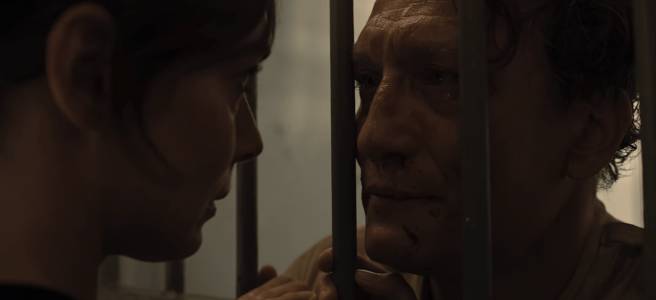
‘You don’t need me,’ she says dismissively as she turns and walks away. If she cannot have him, genuinely, she will not free him. Ulrich’s pleas become more desperate as he is led away, a few choice insults thrown in the mix for good measure. Hannah denies to the young Egon that Ulrich is her husband after all and at last, for both Ulrich and Hannah, we can hope that all illusions are shattered and they can get on with reconciling themselves to themselves, with honesty and healing.
Next time, in my last part of this series, I will be looking at the concept of The Double or Doppelganger and how Dark perverts this by using time travel to reflect even greater levels of angst and Weltschmerz, whilst introducing another Germanic concept into the mix—the Uncanny. Join me next time for another walk in the Winden Woods!

